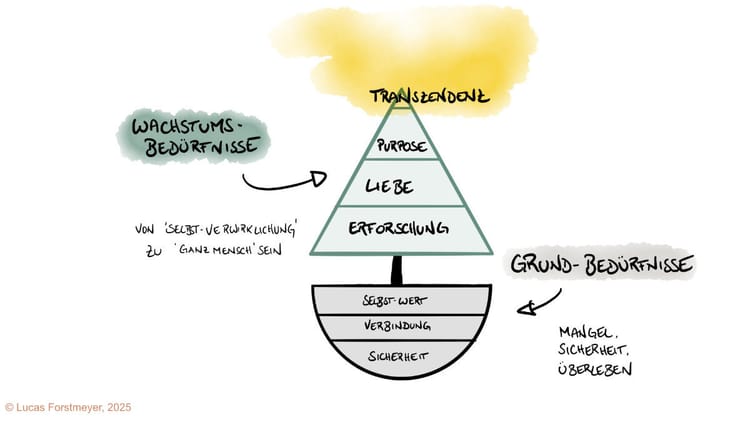5. Glossary: Key Concepts of the Need and Growth Model

Based on Articles 1–4, here is a glossary of the central concepts as they are used in this topic area.
Acceptance (Part of Connection)
The fundamental knowledge of being accepted, seen, valued, and not rejected by important people.
Need Boat
A metaphor that represents needs and the ability to meet them as a boat used to navigate the "ocean of life." It replaces the static Pyramid of Needs and consists of the Hull (Security Needs) and the Sail (Growth Needs).
Pyramid of Needs
A popular but misleading metaphor for needs, which was never drawn by Abraham Maslow himself. It falsely suggests that needs are unlocked like levels in a video game and that basic needs eventually disappear.
Needs
What people require (not just want) for their psycho-biological well-being. If they are not met, the system enters a state of stress – the perception of the world narrows.
Calling
The type of work one does because it is intrinsically fulfilling – even if one were not paid for it.
Exploration (Growth Need)
The first growth need: the natural impulse to understand new things, to courageously face the unknown, and to find meaning in challenges.
Success Loop
A positive cycle in which a successful step leads to a good feeling, which in turn motivates the next step and leads to further success.
Healthy Personality
The ability to integrate both Security Needs (Stability) and Growth Needs (Change).
Healthy Self-Worth
A state in which the question "Am I valuable?" is no longer a question. A quiet, inner knowing that no longer needs loud external confirmation.
Intimacy (Part of Connection)
Deep, vibrant, and meaningful connections that arise when presence, positive regard, and vulnerability come together.
Career (Type of Work)
Work that one does for money and opportunities for advancement.
Emptiness / Meaninglessness
The feeling that arises when the Growth Needs (Sail) are not met. In contrast to "Deficiency," this is not an acute distress but a creeping feeling of inner pointlessness.
Love (Growth Need)
The second growth need. In contrast to Connection (receiving love), this is the attitude of actively encountering the world and other people with appreciation (giving love).
Deficiency (Feeling)
The experience of deficit, danger, or distress that arises when the Security Needs (Hull) are not met.
Mastery (Pillar of Self-Esteem)
The second pillar of self-esteem: the experience of being an agentic and effective being who can set goals and also achieve them.
Failure Loop
A negative cycle in which a failure leads to a bad feeling, which causes hesitation on the next step and leads to further failure.
Neuroception
An unconscious process of the autonomic nervous system, named by Stephen Porges. It constantly scans the environment to answer three questions:
-
Am I physically safe?
-
Am I connected?
-
Am I important?
Purpose (Growth Need)
The third growth need: a higher goal or purpose to which life is aligned. Meaning arises when one moves toward a goal that enables growth.
Hull (of the Boat) / Security Needs / Deficiency Needs
The part of the Need Boat that provides stability and "keeps the person afloat." It represents the basic needs for Security, Connection, and Self-Worth. If they are not met, one experiences a "deficiency."
Sail (of the Boat) / Growth Needs
The part of the Need Boat that provides forward movement, direction, and meaning. It represents the growth needs of Exploration, Love, and Purpose.
Self-Worth (Need)
The third security need (part of the Hull). It relates to the unconscious question: "Am I important?" Stable self-worth arises from real successes and positive interactions with other people.
Security (Need)
The first and most fundamental security need (part of the Hull). It is the deep knowledge "I am secure" and comprises three levels:
-
Not being in danger
-
Being sheltered (having a home)
-
Living in a predictable world
Social Engagement System
A term from Polyvagal Theory. It describes the regulated state in which connection with other people is the most efficient and safest survival strategy.
Social Value (Pillar of Self-Esteem)
The first pillar of self-esteem: the knowledge "I am inherently valuable and have social value in relationships." This feeling arises when one experiences oneself as helpful, connected, and touchable.
Spiritual Component (of Needs)
A deeper level of the security needs. For Security, it is the contact with one's own being ("I am"). For Connection, it is the feeling of being connected to life itself (God, nature).
Connection (Need)
The second security need (part of the Hull). According to Polyvagal Theory, it is the evolutionarily newest and safest survival strategy. It includes the facets of Acceptance and Intimacy.
Sources
- Maslow's Hierarchy of Needs (Simply Psychology) | Artikel (n.d.)
- Kaufman: Transcend - The New Science of Self-Actualization
- Porges: The Polyvagal Theory (GB) | Buch (2011)
Related Articles
- 4. Setting the Sail: How to Unleash Your Full Potential Through Exploration, Love, and Purpose
- 2. What You Really Need for Security and Connection
- 3. The Truth About Self-Worth – and Why You Should Stop Chasing It
- 1. Why the Pyramid of Needs is Outdated – and the 'Needs Boat' is a Better Map for Your Life
- 3.3: The 'As If' Feeling: How Early Experiences Shape Our Implicit Worldview